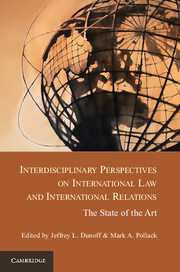 Interdisciplinary Perspectives on International Law and International Relations
Interdisciplinary Perspectives on International Law and International Relations Published online by Cambridge University Press: 05 January 2013
The anarchic nature of the international system is a theme that informs both international law (IL) and international relations (IR) scholarship. Without a centralized governing body to enforce agreements, states that contract at the international level are constantly aware of the possibility of defection. Within international relations, this focus on anarchy has made several scholars pessimistic about the possibility of cooperative activities. Postwar realists emphasized that states can always discard their obligations, whether legal or political, and, therefore, other states cannot put their faith in international agreements (Morgenthau 1978). To the extent that states were forming international institutions and making international obligations, these were likely to be a ratification of the results of power politics and sustainable only as long as the distribution of power remained unchanged (Mearsheimer 1994–95; Waltz 2000).
Against this backdrop of skepticism, regime theorists in the 1980s began to argue that the anarchical nature of the international system was not necessarily a bar to cooperative interactions. They claimed that the increasing number of international institutions in the global system “mattered” to state behavior. The institutions’ rules were constraining state behavior, at least in areas of “low politics,” and the institutions were surprisingly stable in the face of shifts in power between states (Axelrod 1984; Keohane 1984; Oye 1996). These theorists largely explained the creation of international institutions and the subsequent compliance with the institutions’ rules through a combination of states’ needs to overcome collective action problems and concern with their reputations. Keohane (1984: 105) argued that the possible exclusion from international regimes provided states with an incentive to abide by existing international agreements, which can overwhelm the immediate benefits of defection. Early approaches did not differentiate between legal and nonlegal obligation, but later work in political science explored the varying reputational effects of formal and informal obligations (Lipson 1991; Abbott and Snidal 2000).
To save this book to your Kindle, first ensure [email protected] is added to your Approved Personal Document E-mail List under your Personal Document Settings on the Manage Your Content and Devices page of your Amazon account. Then enter the ‘name’ part of your Kindle email address below. Find out more about saving to your Kindle.
Note you can select to save to either the @free.kindle.com or @kindle.com variations. ‘@free.kindle.com’ emails are free but can only be saved to your device when it is connected to wi-fi. ‘@kindle.com’ emails can be delivered even when you are not connected to wi-fi, but note that service fees apply.
Find out more about the Kindle Personal Document Service.
To save content items to your account, please confirm that you agree to abide by our usage policies. If this is the first time you use this feature, you will be asked to authorise Cambridge Core to connect with your account. Find out more about saving content to Dropbox.
To save content items to your account, please confirm that you agree to abide by our usage policies. If this is the first time you use this feature, you will be asked to authorise Cambridge Core to connect with your account. Find out more about saving content to Google Drive.